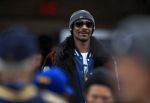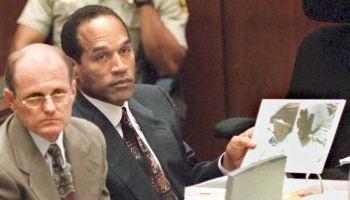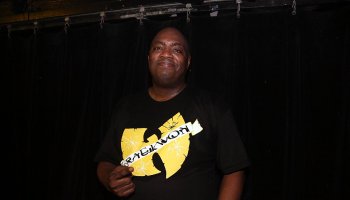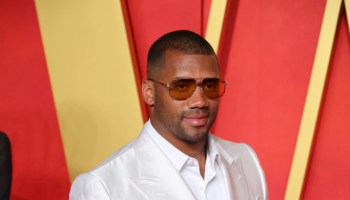Muslim minister and human rights leader El-Hajj Malik El-Shabazz, widely known as Malcolm X, stands as one of the most-influential figures in Black History. Forty-eight years ago today, Malcolm X was gunned down by three assailants, and it has been speculated that the killing was inspired by words from his former Nation of Islam (NOI) compatriot and current leader Louis Farrakhan.
SEE ALSO: Happy Birthday To Actor, Director Sidney Poitier
After a turbulent childhood and engaging in crimes as an adult, the man born Malcolm Little discovered the religion of Islam while in prison. Rising fast as a member of the NOI under the tutelage of the Honorable Elijah Muhammad, Malcolm X would become the face of Black Nationalism and preached with a fiery but intelligent style.
Malcolm X’s position in the NOI was especially instrumental to the growth of the organization. He not only helped verbalize the strong ideals the NOI upheld, but Malcolm X also boosted membership by record numbers. Black men and women flocked to the NOI largely because of his charismatic speaking style and his penchant for openly criticizing White racism.
From 1952 to 1964, Malcolm X was a part of the NOI, but in 1963, he had begun to rethink his involvement. The national spokesperson became increasingly disenchanted with the Nation after he witnessed spiritual leader Muhammad engaging in extramarital affairs and other dealings he disagreed with.
After saying the infamous “chickens coming home to roost” comment regarding the assassination of President John F. Kennedy, NOI officials silenced their star speaker, which led to a further strained relationship.
Breaking away from the NOI, Malcolm X publicly denounced the group and expressed a desire to work with other groups. Although he still considered himself a Muslim, he began working with leaders of other faiths, including a brief meeting with Dr. Martin Luther King, Jr.
Later, he delivered his “The Ballot Or The Bullet” speech, urging African Americans to use their vote.
Listen to “The Ballot or the Bullet” speech here:
In the spring of 1964, however, Malcolm X would discover orthodox Islam after encouragement from Sunni Muslims.
The move to a more traditional version of Islam changed Malcolm X from Black Nationalist to human rights advocate.
With an expanded worldview, Malcolm X led and spoke regularly at his recently opened Muslim Mosque Inc. and worked closely with the Organization of Afro-American Unity.
Death threats began to emerge, and while many suspected COINTELPRO and outside government forces were egging on the tensions between the NOI and Malcolm X, it was apparent something was amiss.
The threats continued both publicly and anonymously, although Malcolm X was staunchly aware of the danger and willing to defend himself (as evidenced in the Ebony magazine photo (pictured above) now famous with the tagline “By Any Means Necessary”).
Louis X (Farrakhan), a minister in Boston at the time, called Malcolm X a traitor and spoke openly of vengeance against his former NOI ally by means of death.
On this day in 1965 at the Audubon Ballroom in Manhattan, Malcolm X was set to deliver an address to the Organization of Afro-American Unity. After a scuffle in the crowd got the attention of his security detail who then moved to silence the fight, a man walked up and shot Malcolm X in the chest with a shotgun.
Two other men later joined in, firing handguns in to Malcolm’s body. Later, it was discovered the men were members of the NOI and later convicted. Amazingly, Norman 3X Butler (Muhammad Abdul Aziz) was paroled in 1985 and went on to lead a mosque after maintaining innocence. Thomas 15X Johnson (Khalil Islam) eventually rejected the NOI’s teaching and became a Sunni Muslim. Islam, who died in 2009, claimed innocence as well. Talmadge Hayer (Mujahid Halim) was the last of the gunmen to be paroled, seeing release in 2010.
Malcolm X’s death shocked the nation, garnering reaction from civil rights leaders and other figures from around world as well. Dr. King, not considered a close ally to the leader, even reached out to his widow Betty Shabazz to offer his condolences.
The funeral was held on February 27 at the Faith Temple Church Of God In Christ in Harlem. Attending were John Lewis, Bayard Rustin, Andrew Young, and James Forman, among others.
Actor Ossie Davis delivered the eulogy and a local news station broadcast the event live. In a great show of unity, actress Ruby Dee and Juanita Poitier (Sidney Poitier’s former wife) raised funds for Betty Shabazz and children in order to secure housing and other needs. Malcolm X’s final resting place is at the Fencliff Cemetery in Westchester County, N.Y.
Listen to Davis’ eulogy of Malcolm X here:
Although silenced for reasons still yet to be revealed officially, Malcolm X and his message still stirs the souls of many. While his earlier stances regarding the position of Black Americans came with a heavy-handed tone, the underlying truth was that Malcolm X preached about being self-sufficient in the face of divisiveness and adversity. Even when his words took a more humanist approach, Malcolm X was still a champion for the liberation of African Americans and Black people the world over.
One could say his growth was expected given the harsh circumstance he lived under, but it’s better to say Malcolm X found his tireless determination by way of unshakeable faith. There are several valuable lessons to learn if one chooses to study his life carefully.
Rest In Eternal Peace, Brother El-Hajj Malik El-Shabazz.
El-Hajj Malik El-Shabazz (Malcolm X) Assassinated On This Day 48 Years Ago was originally published on newsone.com











